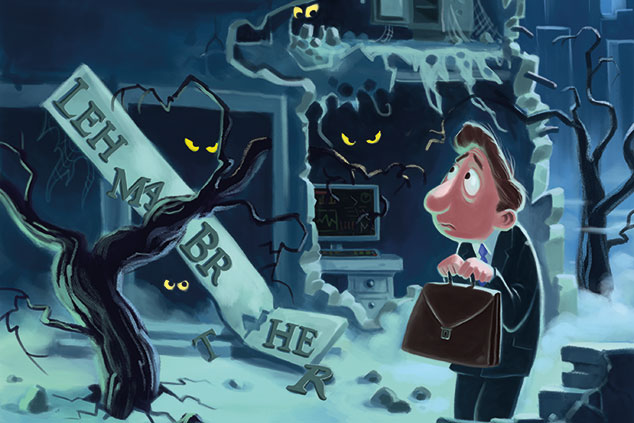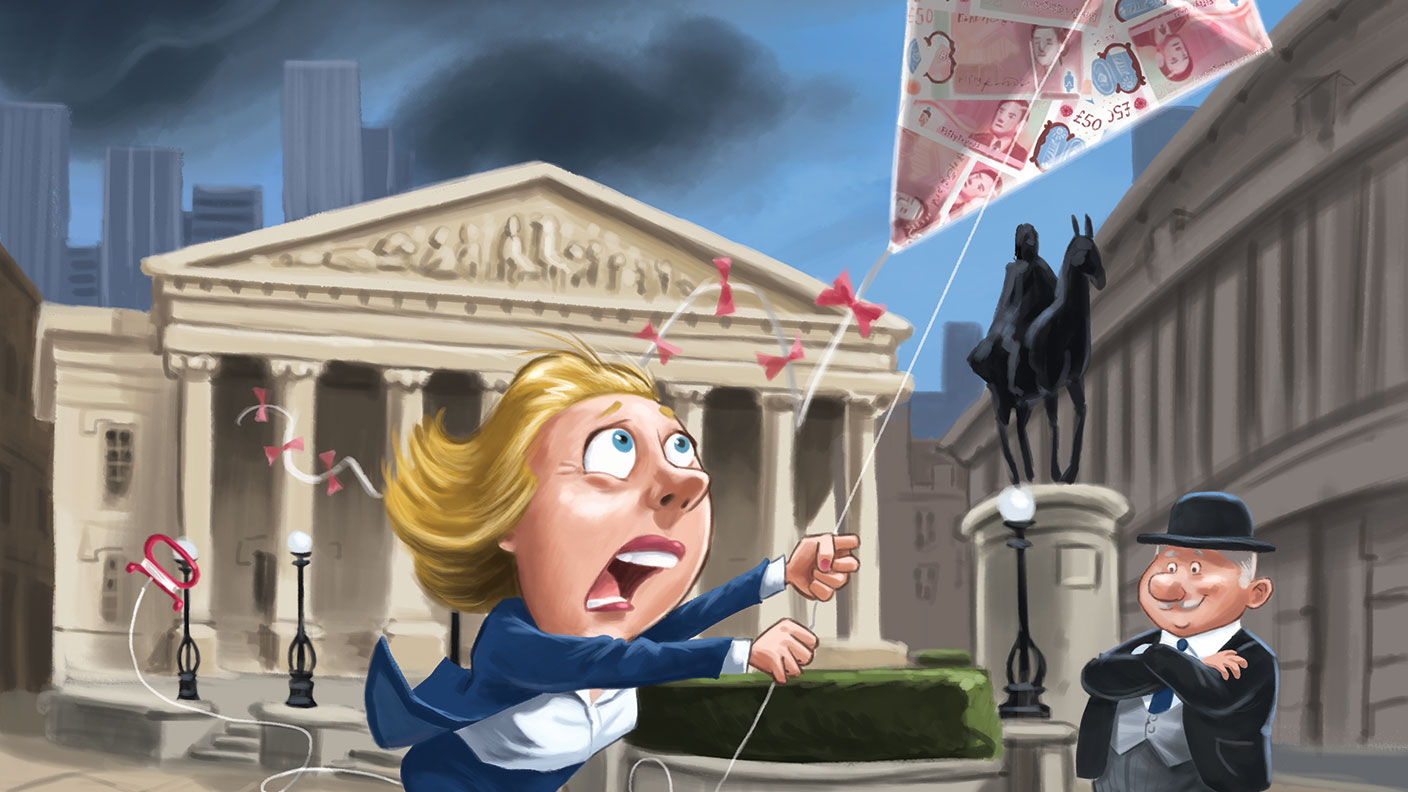Our progress since 2008? Ten years older, and deeper in debt
A decade on from the collapse of Lehman Brothers, it doesn’t look like we’ve learnt any of the lessons of the credit crunch. But the next crisis won’t look the same as the last one, says John Stepek.

Get the latest financial news, insights and expert analysis from our award-winning MoneyWeek team, to help you understand what really matters when it comes to your finances.
You are now subscribed
Your newsletter sign-up was successful
Want to add more newsletters?

Twice daily
MoneyWeek
Get the latest financial news, insights and expert analysis from our award-winning MoneyWeek team, to help you understand what really matters when it comes to your finances.

Four times a week
Look After My Bills
Sign up to our free money-saving newsletter, filled with the latest news and expert advice to help you find the best tips and deals for managing your bills. Start saving today!

This month marks ten years since US investment bank Lehman Brothers collapsed. As our timeline below shows, this was far from the start of the financial crisis. However, it was the critical moment at which it became very clear to even the most disinterested observer that all was not well with the financial world. Banks around the world had enjoyed a tame regulatory framework and a complacent, Wall-Street-friendly central-bank regime under Federal Reserve chief Alan Greenspan. They exploited this overly forgiving backdrop by using financial engineering to create swathes of complex mortgage-backed products that could meet soaring global demand for high-yielding yet apparently "safe" assets. In the pursuit of ever-rising profits and bonus payments, they expanded their balance sheets to breaking point leveraging up (particularly in Europe) to the point where it would only take a very small rise in the number of bad debts on their books to ruin them.
Breaking point came when the US subprime mortgage market suffered a wave of defaults, which spread to the wider US mortgage market. With the now-toxic assets, backed by these mortgage loans, distributed across the financial system, no one was entirely sure who was on the hook for the bad debts. And when Lehman Brothers blew up, all remaining trust evaporated from the financial system. No one was confident that the person or institution on the other side of a deal was willing or able to fulfil their side of the bargain, and there was suddenly no guarantee the central bank would step in to save the day.
As it turned out, of course, the Federal Reserve did step in the panic following Lehman's collapse was the catalyst for a huge injection of money by global central banks and taxpayers, which saw large parts of the financial system bailed out, temporarily nationalised, or (in the case of Europe) briefly swept under the carpet until they could no longer be hidden from view. It would eventually result in "emergency" monetary policy on a scale never seen before, which is only now just starting to be unwound. It also marked the point at which the losers from globalisation and the debt-based monetary system began to outnumber the winners, creating political demand for more drastic change, the results of which we're seeing today.
MoneyWeek
Subscribe to MoneyWeek today and get your first six magazine issues absolutely FREE

Sign up to Money Morning
Don't miss the latest investment and personal finances news, market analysis, plus money-saving tips with our free twice-daily newsletter
Don't miss the latest investment and personal finances news, market analysis, plus money-saving tips with our free twice-daily newsletter
We're not going to reiterate the details of the crash (you can read more about that here). Instead, we want to look at what's changed in those ten years for better and for worse and what's coming next.
The global financial crisis: a timeline
2006: the bubble bursts
Second quarter: US house prices peak29 June: US interest rates peak at 5.25%
2007: the credit crunch
2 Apr: US subprime lender New Centuryfiles for bankruptcy protection7 Jun: US investment bank Bear Stearns freezes two property-exposed hedge funds15 Jun: FTSE 100 closes at pre-crisis high of 6,732July: Bank of England bank rate peaks at 5.75%9 Aug: French bank BNP Paribas freezes three funds as credit tightens14 Sep: Bank of England bails out Northern Rock8 Oct: RBS-led consortium acquires ABN Amro for £49bn in Europe's biggest ever banking takeover9 Oct: S&P 500 closes at pre-crisis high of 1,56512 Dec: Federal Reserve opens "swap lines" with the European and Swiss central banks
2008: the crisis
17 Feb: Northern Rock nationalised16 Mar: Bear Stearns collapses and is bought by JP Morgan, with help from the Fed22 Apr: RBS announces a £12bn rights issue, the biggest in UK history7 Sep: government-sponsored US mortgage lenders Fannie Maeand Freddie Mac placed into government "conservatorship"15 Sep: Lehman Brothers goes bust; Bank of America buys Merrill Lynch16 Sep: insurer AIG is bailed out by the Fed due to its exposure to defaulting toxic bonds17 Sep: Lloyds TSB acquires HBOS with a "nudge" from the UK government under Gordon Brown20 Sep: the US Treasury submits plans to Congress for the $700bn Troubled Asset Relief Program (Tarp)29 Sep: US government rejects Tarp. Panic ensues3 Oct: US government passes Tarp8 Oct: Icelandic banks collapse. Central banks globally, including the Bank of Englandand the Fed, announce co-ordinated rate cuts13 Oct: UK government part-nationalises RBS, Lloyds TSB and HBOS9 Nov: China announces $580bn stimulus plan26 Nov: Fed starts quantitative easing (QE)
2009: the rally begins
3 Mar: FTSE 100 closes at 3,512, a post-crisis trough5 Mar: Bank of England cuts bank rate to an all-time low of 0.5%, and embarks on QE9 Mar: S&P closes at its post-crisis trough of 666October: The newly elected Greek government reveals a black hole in public finances
2010: Europe takes over
March: Greece insists that it needs no bailout.April: Greece is bailed out by the EU and InternationalMonetary Fund (IMF) in exchange for tough spending cutsNovember: Ireland is bailed out
2011: the eurozone crisis
May: Portugal is rescuedJune: Greece is bailed out (again)7 Jul: The European Central Bank (ECB) hikes interest rates to 1.5%August: S&P downgrades US sovereign debt as US politicians squabble over the debt ceilingOctober: Franco-Belgian bank Dexia is bailed outNovember: Mario Draghi takes over at the ECB and cuts rates to 1.25%
2012: whatever it takes
26 Jul: Draghi's promise to do "whatever it takes" to preserve the euro restores confidence and marks the end of the acute phase of the eurozone crisis. QE in starts in January 2015
2013: the taper
May: Fed chairman Ben Bernanke talks about reducing QE. "The taper tantrum" a mild market panic ensues.December: the Fed finally starts "tapering" monthly QE to $75bn from $85bn
2014: the end of US QE
January: Janet Yellen takes over as Fed chief from BernankeOctober: Fed ends QE
Where are we now?
It may not feel like it, but ten years on from Lehman's, there is plenty of good news to point to. Most positively, employment is at record levels in most developed countries outside the eurozone (despite ongoing fears that we will imminently be replaced by robots). That's a better outcome than the Great Depression-style scenario that was feared by many. And global economic growth has been solid indeed, last year, according to the latest annual report from the Bank for International Settlements (BIS), "global growth rates were roughly on a par with pre-crisis long-term averages". Asset prices have recovered, too stockmarkets around the globe have largely regained or beaten their pre-2008 highs, as have house prices. (This, of course, is a double-edged sword it's nice if you own assets, not so nice if you don't.)
However, ultimately, the financial crisis was all about debt. And the news on that front is not so good. In 2007, global debt amounted to 179% of global GDP. Ten years on? Global debt in 2017 stood at 217% of global GDP, according to the BIS. That's not what anyone would call progress. What has changed is the make-up of that debt. Households in developed economies are a bit less indebted for example, household debt in the US has fallen from close to 100% of GDP at its peak to just above 75% now. This is positive, because overly enthusiastic borrowing by households tends to be at the centre of the worst financial crashes. However, companies are more indebted, and the quality of that debt, in terms of credit ratings and lender protections, has deteriorated sharply. And governments are a lot more indebted, as a result of throwing the weight of their national balance sheets behind the collapsing financial system. Emerging-market debt has also risen significantly, driven mainly by an explosion in Chinese debt.
The surviving banks, meanwhile, have grown bigger and more dominant the top five banks in the world control 47% of assets, versus 44% in 2007, notes Gillian Tett in the FT. They are thus still "too big to fail". However, they are more tightly regulated (at least until the lobbyists get their way). As former Financial Services Authority boss Adair Turner notes in the FT, big banks now have to "hold three to five times as much capital as before". Meanwhile, a decade of near-zero interest rates and money printing have bought the banks the time they needed to tidy up their balance sheets. In 2007, notes Yalman Onaran on Bloomberg, the top eight US banks had an average of $2.50 as a buffer for every $100 they had loaned out now that buffer is nearer $7. The banks may not have been sufficiently reformed for our liking but nor are they in imminent danger of causing a repeat of 2008.
What happens next?
It's clear that we're starting to at least try to put the crisis behind us. Global monetary conditions are still loose relative to history, but they are starting to tighten, led by the US. The Federal Reserve has ended quantitative easing (QE) and moved onto quantitative tightening (getting rid of the bonds it bought during the crisis) and has also raised interest rates without markets collapsing (yet). In the UK, the Bank of England panicked in 2016 after the vote to leave the EU, but QE has also ended here and interest rates are rising very slowly. In the eurozone, we have a target date for the end of QE. Even in Japan, the central bank has allowed long-term interest rates to rise ever so slightly. In other words, after ten years, "emergency" monetary policy is finally being withdrawn.
The most obvious problem with this, however, is the one we started with we still need to get rid of that debt. It might have been sustainable with interest rates at rock-bottom levels and central banks ready to buy sovereign debt at any price. But how will we cope as rates tick higher? There are only two ways to get rid of debt that you can't afford to repay. One is by outright default. The other is by inflating it away. Part of the point of QE was the hope that it would ignite inflation and thus enable economies to achieve "escape velocity" getting enough traction to grow their way out of their debts. But as yet, that hasn't happened.
As a result of this, we're seeing a dangerous shift in political mood, warns financial historian Russell Napier. And he is not referring to the leadership changes or referendum outcomes that have the developed-market establishment in a tizzy. He's talking about the rise of the "strong man" in emerging markets. One problem for emerging markets is that it's very hard for them to inflate away their debt because, typically, a big chunk of it is denominated in foreign currencies. "It is thus emerging markets that will be forced to take extreme measures first, and extreme measures require extreme leaders."
In a developed market, notes Napier, even an impulsive and autocratic leader like Donald Trump has to act within the legal system. But the rule of law does not constrain a man like Turkish president Recep Tayyip Erdogan. The same goes for the long list of emerging market strongmen who have taken power in the past few years. The erosion of property rights in these countries is already resulting in "a growing exodus of local savings", the loss of which "has profound long-term economic impacts."
What's next? "Default is one solution, particularly if one has the luxury of defaulting on a foreigner; or sequestration of private wealth under various guises is another," notes Napier. And with the IMF relaxing its attitude towards capital controls in the wake of the eurozone crisis, foreign investors can't rely on the support of global institutions the way they used to. Put simply, if you are investing in emerging markets, you need to be picky. A focus on governance is becoming more important than it has been for decades.
What about developed markets?
In the US, the Fed seems to be convincing investors that it will hold the line against inflation. And on the economic front, while the Fed's actions are tightening monetary policy, James Ferguson of MacroStrategy notes something important: because the US banking system is fixed, banks are now lending money to an extent that will offset the current pace of tightening. In other words, the money supply will keep growing, fuelling growth and inflationary pressures, even as the Fed raises rates. And if the US continues to raise rates at a time when the rest of the world is still struggling to catch up, then a stronger US dollar seems likely which will put more pressure on emerging markets.
Yet that reckons without political interference. Trump has already railed against both rising rates and the strength of the dollar. Also, how would the Fed react in a genuine emerging-markets crisis? Under Janet Yellen, the Fed paid a lot of attention to what was going on around the world it acknowledged that US monetary policy had a huge impact on global monetary conditions and took that into account when acting on rates (for example, the China panic of 2015 certainly delayed the "normalisation" of US monetary policy). So would the Fed be able to maintain its hands-off stance if faced with a genuine panic? Possibly but only if such a panic didn't threaten US asset prices or Trump's mid-term election prospects.
What does this mean for your money? There are a lot of variables, and predicting the future is a mug's game. But the next crisis is highly unlikely to take the same shape as the last. The banking crisis of 2008 forced central banks to take extreme measures to combat deflation, and saw huge debts shifted from the private to the public sector, giving governments all the more incentive to default or inflate those debts away. It also left voters nursing a lot of anger, that can probably only be assuaged by a significant rise in the rewards going to labour rather than capital in short, higher wages and lower asset prices. How do you invest for that? Favour equity over debt (inflation is generally toxic for debt), and, as noted above, consider politics far more carefully than in the past. Be wary of owning companies (multinationals with long supply chains in particular) or other assets (such as housing) that are likely to face the brunt of electoral wrath over the coming years. And own some gold just in case.
Get the latest financial news, insights and expert analysis from our award-winning MoneyWeek team, to help you understand what really matters when it comes to your finances.

-
 How a ‘great view’ from your home can boost its value by 35%
How a ‘great view’ from your home can boost its value by 35%A house that comes with a picturesque backdrop could add tens of thousands of pounds to its asking price – but how does each region compare?
-
 What is a care fees annuity and how much does it cost?
What is a care fees annuity and how much does it cost?How we will be cared for in our later years – and how much we are willing to pay for it – are conversations best had as early as possible. One option to cover the cost is a care fees annuity. We look at the pros and cons.
-
 Governments will sink in a world drowning in debt
Governments will sink in a world drowning in debtCover Story Rising interest rates and soaring inflation will leave many governments with unsustainable debts. Get set for a wave of sovereign defaults, says Jonathan Compton.
-
 Why Australia’s luck is set to run out
Why Australia’s luck is set to run outCover Story A low-quality election campaign in Australia has produced a government with no clear strategy. That’s bad news in an increasingly difficult geopolitical environment, says Philip Pilkington
-
 Why new technology is the future of the construction industry
Why new technology is the future of the construction industryCover Story The construction industry faces many challenges. New technologies from augmented reality and digitisation to exoskeletons and robotics can help solve them. Matthew Partridge reports.
-
 UBI which was once unthinkable is being rolled out around the world. What's going on?
UBI which was once unthinkable is being rolled out around the world. What's going on?Cover Story Universal basic income, the idea that everyone should be paid a liveable income by the state, no strings attached, was once for the birds. Now it seems it’s on the brink of being rolled out, says Stuart Watkins.
-
 Inflation is here to stay: it’s time to protect your portfolio
Inflation is here to stay: it’s time to protect your portfolioCover Story Unlike in 2008, widespread money printing and government spending are pushing up prices. Central banks can’t raise interest rates because the world can’t afford it, says John Stepek. Here’s what happens next
-
 Will Biden’s stimulus package fuel global inflation – and how can you protect your wealth?
Will Biden’s stimulus package fuel global inflation – and how can you protect your wealth?Cover Story Joe Biden’s latest stimulus package threatens to fuel inflation around the globe. What should investors do?
-
 What the race for the White House means for your money
What the race for the White House means for your moneyCover Story American voters are about to decide whether Donald Trump or Joe Biden will take the oath of office on 20 January. Matthew Partridge explains how various election scenarios could affect your portfolio.
-
 What’s worse: monopoly power or government intervention?
What’s worse: monopoly power or government intervention?Cover Story Politicians of all stripes increasingly agree with Karl Marx on one point – that monopolies are an inevitable consequence of free-market capitalism, and must be broken up. Are they right? Stuart Watkins isn’t so sure.